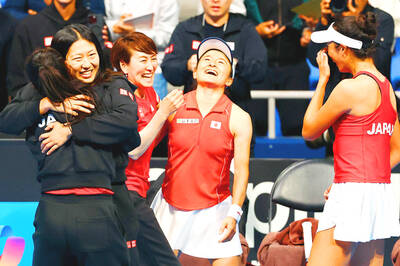Angola is betting on the Roller Hockey World Cup to bolster employment and tourism in a country where more than half the population lives in poverty.
The Southern African nation has spent US$89 million building three pavilions in the capital, Luanda, and in the towns of Malange and Namibe and a further US$17 million for the 41st staging of the tournament that began yesterday. Officials say the 16-nation event will boost employment and attract interest from the country’s youth.
“The country will become more known and we’ll have less people taking part in risky behavior such as crime because they’ll be entertained and busy with hockey,” said Pedro Azevedo Chipita, deputy coordinator of the organizing committee. “And we’ll create jobs.”
Currently tourists are rare because of a visa system that can take months before entry is granted, while 54 percent of the population lives on less than US$1.25 a day, according to the UN. The Angolan economy ministry puts the unemployment rate at more than 20 percent.
Tickets cost the equivalent of US$2 to US$20 and are good for an entire day’s matches at one location, which could be as many as three games early in the tournament. Paulo Branco, an administrator at the ticket sales company, could not say how many foreigners would visit the country during the competition.
The game, sometimes called quad-hockey in the US for the four-wheel skates used, is played in about 60 countries and was a demonstration sport at the 1992 Summer Olympics in Barcelona. Portugal, which brought the game to Angola during colonial rule, and Spain are the strongest nations with 15 world titles apiece. Italy has four.
Roller hockey’s old-style skates allow greater agility than ball hockey, which is usually played on asphalt using in-line skates.
“This event will help diversify sports in Angola given the recently constructed sports infrastructure,” Chipita said. “You can see there’s roller hockey fever, the city is full of skaters.”
Luanda’s 11,740-seat pavilion was almost sold out earlier this week for yesterday’s opening match between the hosts and South Africa.
Basketball and soccer are the most popular sports in Angola and the country won the African Basketball Championship this year. It hosted soccer’s African Cup of Nations in 2010, building new stadiums in four cities at a cost of US$600 million, according to the government. That event was marred by the killing of two members of the Togo squad by separatists in the northern region of Cabinda. About 4,000 police will be on hand for these games, organizers said.
“We hope to achieve fourth place since there are stronger teams,” said Helio Aragao, a spokesman for the organizing committee. “If we can place higher, all the better.”
Angola are in group C with Portugal, Chile and South Africa. France, Germany and Argentina play in group B along with Uruguay, who replaced England. They dropped out of the tournament for financial reasons,
The US competes in group D with Mozambique, Italy, and Colombia, while group A comprises Brazil, Switzerland, Austria and Spain.

College basketballer Kaitlyn Chen has become the first female player of Taiwanese descent to be drafted by a WNBA team, after the Golden State Valkyries selected her in the third and final round of the league’s draft on Monday. Chen, a point guard who played her first three seasons in college for Princeton University, transferred to the University of Connecticut (UConn) for her final season, which culminated in a national championship earlier this month. While at Princeton, Chen was named the Ivy League tournament’s most outstanding player three times from 2022 to last year. Prior to the draft, ESPN described Chen as

College basketballer Kaitlyn Chen (陳凱玲) has become the first player of Taiwanese descent to be drafted by a WNBA team, after being selected by the Golden State Valkyries in the third and final round of the league's draft yesterday. Chen, a point guard who played her first three seasons in college for Princeton University, transferred to the University of Connecticut (UConn) for her final season, which culminated in a national championship on April 6. While at Princeton, Chen was named the Ivy League tournament's most outstanding player three times from 2022 to last year. Prior to the draft, ESPN described Chen as a

Japan yesterday secured a second consecutive Billie Jean King Cup finals appearance with a 2-1 win over 2023 champions Canada, thanks to Ena Shibahara and Shuko Aoyama’s 6-3, 5-7, 6-2 win over Kayla Cross and Rebecca Marino in the qualifying doubles decider. Shibahara and Aoyama powered through the opening set 6-3, breaking twice for a quick 3-0 lead. Cross and Marino hit back in the second, edging it 7-5 to level the match, before the Japanese pair regained control in the third. Canada’s 18-year-old Victoria Mboko edged Shibahara 6-4, 6-7 (8/10), 7-5 in a marathon opening clash. Mboko fired eight aces to

Kumar Rocker, a first-round pick in both the 2021 and 2022 drafts, on Thursday won for the first time in the major leagues. Rocker struck out a career-best eight in a career-best seven innings as the Texas Rangers beat the Los Angeles Angels 5-3 to complete a three-game sweep. Rocker (1-2) threw a career-high 78 pitches and allowed three runs on five hits without a walk. The 25-year-old right-hander was drafted third overall by Texas in 2022, a year after concerns over a physical led to him going unsigned by the New York Mets as the 10th overall pick. He made his major